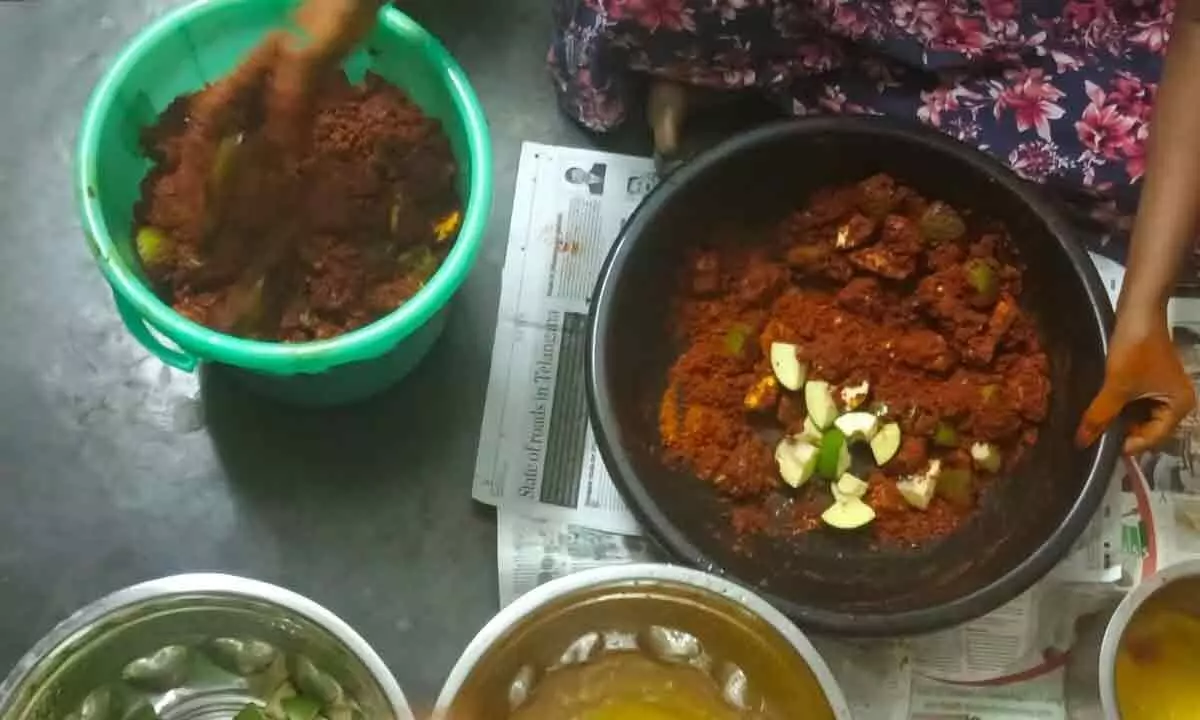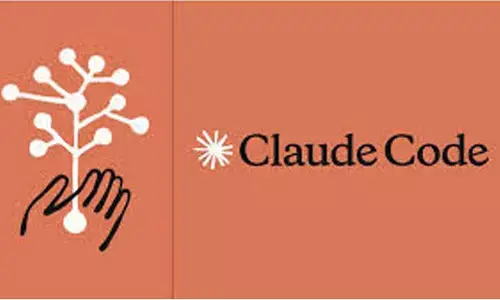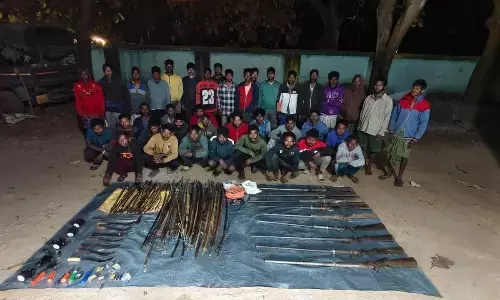Kakinada: Mango pickle turns unaffordable for commoner

Mango pickle in the making
Andhra Avakaya is likely to become a thing of past in view of the spiralling prices of red chilli powder, mangoes as well as sesame oil in Kakinada and Konaseema districts.
Kakinada (Kakinada District): Andhra Avakaya is likely to become a thing of past in view of the spiralling prices of red chilli powder, mangoes as well as sesame oil in Kakinada and Konaseema districts. Common man will not be in a position either to prepare or buy mango pickle. In hotels and hostels, they may dispense with this pickle. Even middleclass families are avoiding preparing mango pickle this year as the rates of essential ingredients involved in the preparation have shot up.
On the other hand, small private home makers of mango pickle are also giving up preparing the pickle in view of the high cost of the ingredients. Consequently, their business has drastically come down.
Last year, red chilli powder cost was Rs 480 per kg and this year it shot up to Rs 740 per kg.
Most of the people use Kothapalli Kobbari variety of mango for making the pickle. The cost of each Kothapalli Kobbari mango is from Rs 35 to Rs 40, which was Rs 25 last year.
Also, price of sesame oil per kg was Rs 300 last year whereas now it has gone up to Rs 340 to Rs 400 per kg.
In Godavari region, both families and private manufacturers prepare about 10 varieties of mango pickles, like Menti Avakaya, Bellam Avakaya, Pulihora Aavakaya, Magai etc. With the high prices, it seems that they have to be content with one or two varieties only.
Speaking with The Hans India, Kakinada District Horticulture Officer BV Ramana said that special variety Kothapalli Kobbari used in making mango pickle is cultivated in Tuni and Thondangi mandals in Kakinada. 'In the wholesale market, each mango of this variety cost about Rs 30. Other varieties of mangoes like Suvarnarekha is priced at Rs 25, Banginapalli at Rs 30 and Collector at Rs 15.' The cost will increase in retail market, he added.
Ramana said that red chili is cultivated in 200 hectares in Pithapuram and Gollaprouli of Kakinada district. The cost of chillies is likely to go up in view of labour charges and pesticides. Red chilli is cultivated in Chinturu agency of Alluri Sitharama Raju district.
A red chilli vendor, K Ramakrishna, speaking with The Hans India, said that rate has gone up due to Covid -19 and also due to the damage caused to red chilli crops by incessant rains. Last year, they sold chilli powder at Rs 450 per kg, but now it is Rs 740 per kg, he informed.
At this rate, it will cost more than Rs 11,000 to prepare mango pickle with 50 mangoes.
A home maker VT Lakshmi said that in view of the spiralling prices of essential ingredients used for preparing mango pickles, it would be difficult to undertake these business enterprises and hence many of them are avoiding to take up the preparation of mango pickles from this season.
She further said that in preparing mango pickle they use Kothapalli Kobbari in Godavari region, which is not easily available at
low cost.
A pickle vendor G Ananta Lakshmi said that middleclass people are not interested to purchase the pickle in bulk due to high price. Hence, small entrepreneurs are preparing in small quantities only. She said that in the past they used to get Rs 25,000 as profit after investing Rs 1,00,000. But the situation has changed, and they can hardly get Rs 5,000 to Rs 10,000 after investing Rs 1 lakh now.
Speaking to The Hans India, a homemaker K Savitramma said that because of the chemicals used in the cultivation of chilli, mangoes and other ingredients and in oil, the pickle cannot last long. They may get spoiled after six months. That means, people wont purchase pickle after six months and their investment will go waste, she stated.
Savitramma said that a few years ago pickles retained colour, taste and smell without getting spoiled. But today they get easily spoiled within six months because of chemicals used in cultivation of mangoes and chillies.











